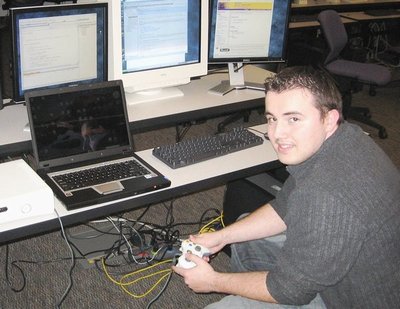May 10, 2007
Game on: Professor brings XBox 360 into the classroom
Video games are so addictive that the Chinese government is attempting to restrict playing time in online cafés to three hours a day. But a teacher at UW Bothell is actually encouraging his students to pick up a joystick.
Kelvin Sung, an associate professor of computing and software systems, began using video games a few years ago to spice up his introductory computer graphics programming course. This year he won an award from Microsoft Research that provides $80,000 to buy more machines and expand his program.
“I teach computer graphics by cheating students into thinking they are learning about computer games,” Sung said.
For Sung, necessity was the mother of pedagogic innovation. When he started teaching the computer graphics class in 1999 he lectured at the front of the room. On the first day of class he had 42 students. About half dropped out by the end of the first week. In 2000 enrolment plummeted to just 10 students.
“In computer graphics the first thing you want to learn is linear algebra,” Sung said. “It’s the most important thing.” But matrices and vectors were scaring off prospective pupils.
For the past five years, Sung has had students design video games for their final projects. Basic graphics concepts are applied to the more creative problem of designing a game. Enrolment is now at 44 students with a four-person waiting list. “I still do linear algebra,” he said. “But now it’s all hidden in games.”
Now Sung is taking the next step. He will design his own games to replace the paper-and-pen assignments used in introductory computer science courses.
“It’s like in the 70s when you have these adventure games that are all text-based. It says you’re in a room and there’s a door, and you type to go through a door,” Sung said. “Right now, a lot of the programming assignments are that way.”
A traditional, paper-based assignment might describe a scenario involving a bouncing ball. Students would be asked to dutifully write the direction and final position as a set of two numbers. In the new approach, an Othello board on the screen could represent the two-dimensional grid. Students would use a handheld controller to move the tiles to the right place.
Sung is collaborating with Michael Panitz, professor of software programming at Cascadia Community College, to design six video-game assignments. They are using the XNA framework, a programming tool, to write games that run on Microsoft’s Xbox 360. Next fall Sung and Panitz will teach two, parallel sessions of the introductory computer-programming class. It will be a crapshoot whether students are doing traditional (Sung stops himself before saying “boring”) paper assignments, or whether they are guinea pigs for the new games.
During the class, Rebecca Reed-Rosenberg from the UW-Bothell Teaching and Learning Center will assess students’ learning. At the end of the quarter the team will compare how well the students in each class learned the fundamental concepts. Ruth Anderson in the UW-Seattle Department of Computer Science and Engineering and an outside consultant will provide an independent evaluation. Sung believes students will learn the concepts just as well, if not better, on a video screen.
The recent Microsoft grant is one of six the company gave to university researchers who are using its video games to teach computer science.
“Having such a high-caliber, academic XNA advocate [who’s also] local is great,” said John Nordlinger, manager of Microsoft Research’s External Research and Programs group, of Sung. “Having someone so energetic and positive makes it a blessing.”
The first two machines were a gift from Microsoft. Sung is using the grant to assemble a stable of 10 gaming machines at his Bothell office.
“Now I go to Target to buy an Xbox and charge it to my research grant,” Sung said. “It’s kind of funny.”
If the experiment is successful, Sung plans to offer his assignments to other instructors who are teaching introductory computer science classes.
Sung’s homepage: http://faculty.washington.edu/ksung/index.html.
Microsoft Research award: http://research.microsoft.com/ur/us/fundingopps/RFPs/Gaming_RFP_September2006_Awards.aspx.




